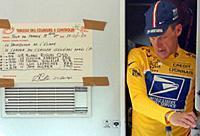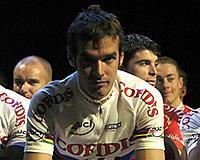
Recently on Cyclingnews.com |
Special feature, August 4, 2004
Witch hunting in the 21st century
In the enthusiasm of the media and authorities to catch and punish users of banned performance-enhancing drugs, basic human rights of athletes - both innocent and guilty - are being ignored. Sports lawyer Michelle Gallen, a former senior adviser at the Australian Sports Drug Agency, analyses the issues.
In the sporting world, a nasty 15th century phenomenon has resurfaced in the last few months. I am referring of course to the witch hunt, a sport favoured by some in the UK, France and the USA hundreds of years ago. In this modern version, France and the USA are still key locations, but Australia has joined in. And the witches have necessarily evolved (given witchcraft itself is rather trendy nowadays) into the evil spectre of an athlete on drugs.
Apart from the change in target, not much else is different in this contemporary witch hunt. Alleged offenders are still guilty unless proven innocent, with an exceptionally high burden of proof prevailing. (Remember the stories of innocent women told that the only way to disprove their status as witches was to drown when cast into the river weighted with stones?) And guilt, it would now appear, can be first presumed upon evidence as simple as the word of a neighbour.
Let's examine the current cases.
Lance Armstrong

|
In France, two recent cases of doping allegations have grabbed headlines: an ongoing investigation involving some members of the Cofidis cycling team, and a recently released book accusing Lance Armstrong of injecting illicit substances.
The allegations involving Armstrong can be dealt with fairly swiftly. On 14 June this year, news broke that a new book entitled LA Confidential: The Secrets of Lance Armstrong was to reveal "strong circumstantial evidence" that Armstrong had used performance-enhancing drugs. The authors of the book? Two journalists, of course. People in the strongest position to know what will sell text. Armstrong, who has had to respond to so many doping allegations in his stellar career (and people say Australians have 'tall poppy syndrome'), this time sought legal relief and filed a claim in a Paris court to force the publisher to insert his denials into the book. In the first instance and again in an appeal, Armstrong's claim has failed. The book has been on sale in France since mid-June. Rumour has it that Armstrong will continue on and sue the authors for defamation. Leaving Armstrong in the position of, yet again, pleading his innocence even though no proof of guilt has been provided. As one more enlightened Australian journo suggested, it looked like he was using the allegations as motivational fuel as he rode to his sixth Tour de France title.
Cofidis
The allegations concerning Cofidis cyclists are a little more complex. News broke on January 13 that police in France had detained Cofidis soigneur Boguslaw Madejak, suspected of supplying doping products. At around the same time, the home of a former Cofidis rider, Robert Sassone, was searched, and a quantities of testosterone, EPO and amphetamines were found that were, according to police, "consistent with personal use and not with large-scale trafficking". A second former Cofidis rider, Marek Rutkiewicz, was stopped at Charles de Gaulle airport and found with products on him which he claimed were legal supplements. These were sent to a laboratory for testing.
 |
Within days these three incidents were being reported as 'the Cofidis affair', with Rutkiewicz apparently carrying 'suitcases full of illegal drugs' and 'stocks of drugs' having been found elsewhere (a reference, one can only assume, to the products found at Sassone's home). The following week, (then) current Cofidis riders Philippe Gaumont and Cedric Vasseur were questioned by police. Gaumont, who had previously failed at least three drug tests, reportedly made broad claims about cyclists needing to use and all using drugs, and more specific claims about use of banned substances by other Cofidis riders and provision or administration of those substances by team management. Gaumont has since been sacked and in Vasseur's case, experts have confirmed that his signature on certain statements in his case file is a forgery.
Further Cofidis riders were investigated by police on the basis, it would appear, of Gaumont's allegations. From 9 April - 5 May, Cofidis suspended the entire road team from competing anywhere pending the investigations. When they returned to competition, they were minus their team manager and team doctor. Vasseur remains under investigation along with Mederic Clain, and more recently David Millar has confessed to using EPO after questioning by French police and been sacked from the team. Riders under investigation were all barred from racing in the Tour de France. Vasseur, also excluded from the French national championships, mounted a legal challenge to his exclusion, logically arguing that it conflicted with the presumption of innocence till proven guilty.
It must be remembered, although it seems to have been largely ignored, that Cofidis is a much larger team than those few cyclists who have been implicated in this doping investigation. Many innocent riders have missed opportunities to race this season, but worse have had their names and reputations dragged through the mud by association. And it does not stop with the damage done to Cofidis team members, as public statements by people in authority, such as head of World Anti-Doping Agency Dick Pound, have tarred all professional cyclists with the same brush. Pound was heard to say in late January that "Gaumont's admission shows that the sport has not cleaned up its act" (prompting a very public battle with Lance Armstrong who wrote an open letter to the media in reply).
The promulgation of these opinions by the media does further damage to reputations and blatantly ignores any presumption of innocence. As outlined above, examples such as the portrayal of personal supplies of products as 'stores of drugs' and some unidentified substances as 'suitcases full of illegal drugs' abound in the telling of this tale by various journalists. The credence paid to statements by athletes that have been caught doping, such as Gaumont, is as astounding as it is commonplace - the cry of 'I had to because everyone else does' is becoming a little old, but must still sell newspapers.
In Australia, exaggeration contained in reports combines with an unfamiliarity with the French criminal system to make the incidents appear far more severe than they may really be. Reports of cyclists being questioned by magistrates imply, to an Australian public, that charges must have already been laid, as is the case in this country before a defendant appears in court. This is in contrast to the French system of judicial investigation whereby magistrates (juges d'instruction) question both witnesses and suspects to an alleged offence. Other differences in French investigative procedure include wider powers relating to the tapping of phones, search and detention.
It is also unusual for Australians to hear of doping charges being dealt with by the criminal law and not sporting organisations. It is important to note here that the use of prohibited substances by an athlete is not a crime in France any more than it is here. However, to prescribe or administer a prohibited substance to an athlete does incur criminal penalties (of up to five years in prison) under the French Code of Public Health. So the purpose of police questioning cyclists, in this instance, is not so much to ascertain whether those cyclists are guilty of doping as to discover who has provided them with the doping products. Of course, any admissions made by cyclists of personal use during these examinations, can then be used by sporting federations to sanction them in the usual way.
Due to these differences between the Australian and the French laws, reports of incidents seem even more sensational here than they are written to be.
Part 2: Mark French and the Australian Institute of Sport
